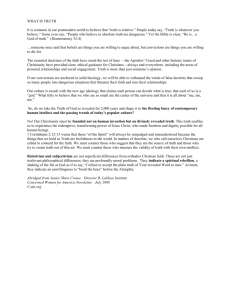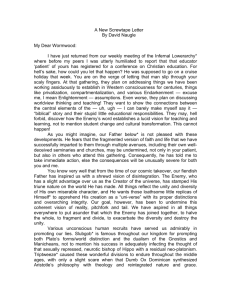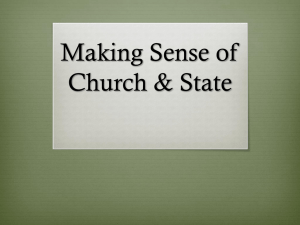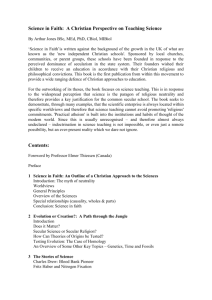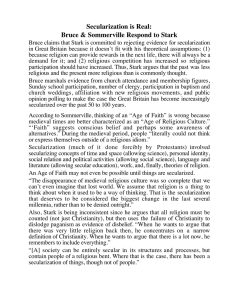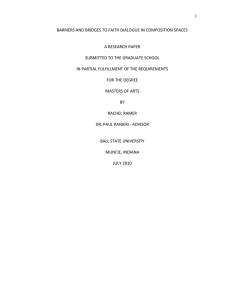2012 Annual Lecture Christianity and Society
advertisement
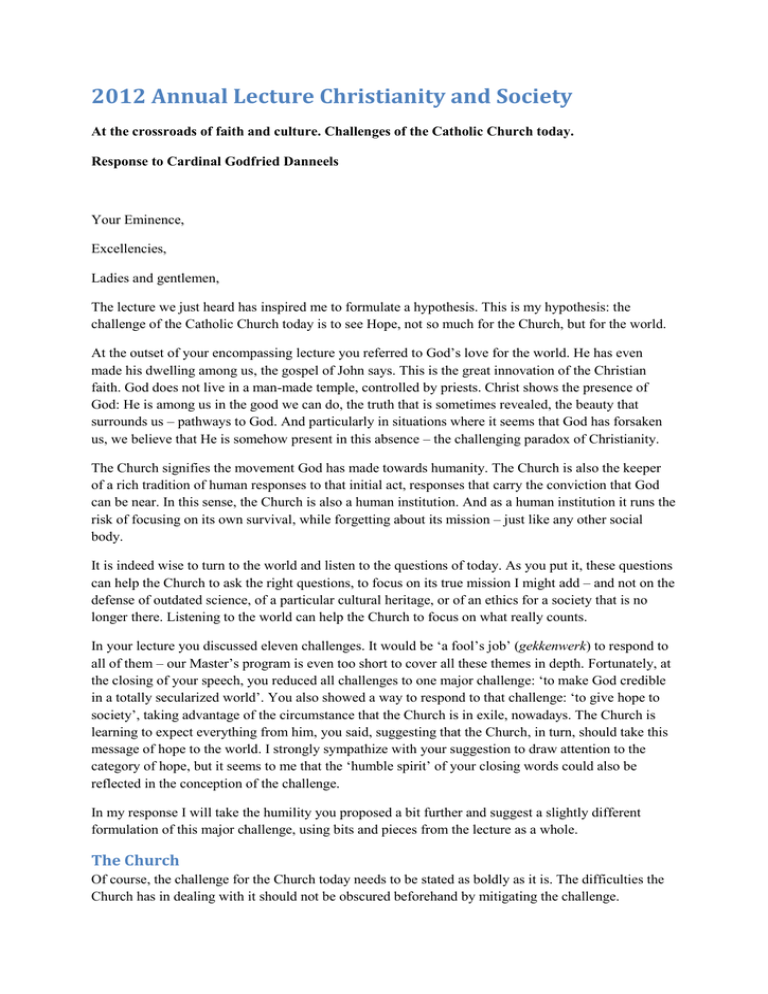
2012 Annual Lecture Christianity and Society At the crossroads of faith and culture. Challenges of the Catholic Church today. Response to Cardinal Godfried Danneels Your Eminence, Excellencies, Ladies and gentlemen, The lecture we just heard has inspired me to formulate a hypothesis. This is my hypothesis: the challenge of the Catholic Church today is to see Hope, not so much for the Church, but for the world. At the outset of your encompassing lecture you referred to God’s love for the world. He has even made his dwelling among us, the gospel of John says. This is the great innovation of the Christian faith. God does not live in a man-made temple, controlled by priests. Christ shows the presence of God: He is among us in the good we can do, the truth that is sometimes revealed, the beauty that surrounds us – pathways to God. And particularly in situations where it seems that God has forsaken us, we believe that He is somehow present in this absence – the challenging paradox of Christianity. The Church signifies the movement God has made towards humanity. The Church is also the keeper of a rich tradition of human responses to that initial act, responses that carry the conviction that God can be near. In this sense, the Church is also a human institution. And as a human institution it runs the risk of focusing on its own survival, while forgetting about its mission – just like any other social body. It is indeed wise to turn to the world and listen to the questions of today. As you put it, these questions can help the Church to ask the right questions, to focus on its true mission I might add – and not on the defense of outdated science, of a particular cultural heritage, or of an ethics for a society that is no longer there. Listening to the world can help the Church to focus on what really counts. In your lecture you discussed eleven challenges. It would be ‘a fool’s job’ (gekkenwerk) to respond to all of them – our Master’s program is even too short to cover all these themes in depth. Fortunately, at the closing of your speech, you reduced all challenges to one major challenge: ‘to make God credible in a totally secularized world’. You also showed a way to respond to that challenge: ‘to give hope to society’, taking advantage of the circumstance that the Church is in exile, nowadays. The Church is learning to expect everything from him, you said, suggesting that the Church, in turn, should take this message of hope to the world. I strongly sympathize with your suggestion to draw attention to the category of hope, but it seems to me that the ‘humble spirit’ of your closing words could also be reflected in the conception of the challenge. In my response I will take the humility you proposed a bit further and suggest a slightly different formulation of this major challenge, using bits and pieces from the lecture as a whole. The Church Of course, the challenge for the Church today needs to be stated as boldly as it is. The difficulties the Church has in dealing with it should not be obscured beforehand by mitigating the challenge. However, one has to reckon that it is also, so to speak, the Church, a cardinal of the Church to be precise, who is expressing this challenge. So, it is the (official) Church asking herself: ‘how do we make God credible?’ This is a question that makes us humble, indeed. ‘Those institutions that ought to make the invisible God visible on this planet have failed to make him credible.’ This has happened throughout the entire history of the Church and Christianity. Popes and theologians have exhorted the crusaders, bishops have supported fascist regimes, and in recent decades ecclesial authorities have ignored the harm done to boys and girls by representatives of the Church, being more concerned for the prestige of the Church than for the human dignity of ‘ordinary’ believers. The European Values Study shows clearly that in countries where it has become publicly known that the Church has, in this sense, had the role of the aggressor, trust in the Church has diminished sharply. I ask you now to look at this issue with some detachment. It is interesting that both Church officials and many of their opponents are departing from the idea that it is especially shocking that the Church is responsible for improprieties. One would expect the Church to be ‘holy’, immune for the vices of abuse of power, laxity en covering-up. Of course, one should be excited and outraged. But the biggest mistake would be to keep on believing that it would be unthinkable that this could happen in the Church. The holy Church is populated by humans. Humans make mistakes. Therefore, there have to be screening and controlling procedures, open communication and consultation, transparent balances of power, as you suggested. Just like in any other organization. This, in my perception, is the fundamental lesson history teaches us. Church and Christianity have always been and are always part of culture. The Church does not enter – any – culture from outer space. There is no original, pure, (Semitic) Christianity which later inculturated in Greek, Latin, Germanic and African culture. Historically, Christianity is a legacy from the Hellenistic world, where Hellenistic Judaism and Greek philosophy interacted and made sense to the people in the urban Mediterranean areas, including Africa. It was situated in that culture; centuries later, expansive European culture was Christian; conservative bourgeois culture was Christian; paternalistic culture was Christian. Then and now, the Church is called to join and sustain the struggle for liberation, justice, peace, the care for the earth and human dignity, and thus promote the credibility of the God who has shown his face in Jesus. Often, but certainly not all the time, the Church has responded to this calling. The world I now turn to what the challenge says about the world: that it is ‘totally secularized’. Here, I am not sure what you mean. Surely, you are not referring to the sociological process of secularization. This process, the declining power of religious regimes, is still going on in Europe and is moving in an opposite direction elsewhere. The rising influence of religion in the public domain of countries in the Middle East is a clear example of that. All over the world, religions and new forms of spirituality are present in the public domain, so, apparently, the secularization process has not come to an end. Yes, in countries like the Netherlands and Belgium the influence of the Christian religion has diminished severely, particularly in the private domain. However, this does not imply a total and global secularization. Nor is this necessarily a process that should be evaluated in a negative way: the collectivization of confessional initiatives in health care, teaching and education, charity, social institutions and culture indicate that these were successful and appreciated by the society at large. I do recognize the ideology that religion should be banned from the political, sometimes even public domain: secularism. This ideology, in its radical form, has succeeded in practice nowhere, not even in France or in Turkey. So this cannot be the reality you referred to either; moreover, it does not imply the ‘total rejection of God’ as such. Atheism at an individual level is rare. In the Netherlands, only a small, quite stable minority of atheists proclaims that they do not believe in God or anything ‘beyond’ – and there is no reason to expect them to be more obsessed with money, pleasure and power than others. We do live in an age in which it is no longer impossible to live without religion: a secular age. But our age is not without faith. Your lecture provided numerous examples. People, also outside the Church, are interested in the Bible and in the Christian tradition. They are discovering the value of prayer, meditation and spirituality. New religious movements (including the so-called ‘sects’), despite their shortcomings, signify a longing for God. The interest for Buddhism reveals the wish to practice nonattachment; the interest for Islam to submit one’s life to God. And then there are the encouraging developments in African and Asian Christianity that you mentioned. Faith is not absent in the world. There are also discouraging developments in this respect. Sometimes the distinction is hard to make. You mentioned the ‘idols of our time’. Across our highways we see the preposterous cathedrals of financial capitalism. On TV we witness the industrialization of entertainment. In politics we observe the disregard of the common good. On the other hand, movements addressing and fighting these ‘structures of sin’ draw our attention as signs of hope. In your lecture you mentioned more signs like these and I will name a few. The ‘allergy towards any pretense of the Churches, that they possess and affirm the truth’ is hopeful. This attitude may reflect a central Christian belief: that we do not have the truth in our pockets, since the truth is in God. You also mentioned the human resistance against suffering and death, evils which, at the end, have to be accepted in this world. A sign of hope. Fundamentally, you suggested, the human heart is imbued with a transcendental drive toward universal love. All these observations sustain the idea that there is a weak force at work in this world: hope. Conclusion To put it bluntly, the Church does not have to convince a godless world to believe in God. The Church does not oppose the world, and she does not have to bring to it Whom it has not got. He is already among us, though sometimes we may not recognize Him. The Church embodies the faith that He is among us. She is on the road of faith. The Church is also part of the world that God created, that He sent his Son to and that He promised to complete. The Church is on the road of culture as well. She is at the crossroads of faith and culture, constantly moving on in the tradition of faith through all cultures we can think of. The major challenge for the Church is to realize that she is, so that she may promote faith – faith in the hope that is already in us. Of course, this Church also needs to provide adequate structures to nurture this faith (the internal challenges), but I agree that the most important challenge is external: to perceive the sprouts of the Kingdom shooting up, to join partners in engaging in what really counts. As Charles Peguy put it beautifully indeed: God is amazed by the hope he sees in people. We are often inclined to think that her big sisters, Mrs. Faith and Mother Love, show Hope the way. But in fact it is the little girl Hope, falling and standing up, who gives light and direction to all what lives between people, all their pacing backwards and forwards. Kees de Groot (Fragment: The portal of the mystery of hope)
